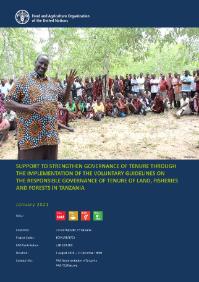
Topics and Regions
Landpages.co.ke is a medium of passing this message.
Details
Public Email
Location
Contributions
Displaying 541 - 550 of 740Gendered health impacts of industrial gold mining in northwestern Tanzania: perceptions of local communities
Mining projects affect the health of surrounding communities by inducing environmental, economic, social and cultural changes in different population groups. Health impact assessment (HIA) offers an opportunity to manage these impacts. This paper aims to explore gender differences of impacts on the wider determinants of health as described by communities impacted by industrial gold mining and consider the implications for impact assessment. We conducted 24 gender-separated, participatory focus group discussions at three study sites in northwestern Tanzania.
The ambiguity of transparency in the artisanal and small-scale mining sector of Tanzania
This paper examines the newly established mineral markets in Tanzania. These markets aim to ensure tax revenue collection and enhance the transparency of mineral trade within the artisanal and small-scale mining sector. Drawing on ethnographic fieldwork in the Geita Region, we show that the enhanced transparency facilitated by these new markets has benefitted artisanal and small-scale gold miners. However, the living conditions of the miners and opportunities for profit have not changed significantly and the miners do not expect that a more transparent value chain will improve their lives.
Small Family Farms Country Factsheet
Tanzania is a low-income country in Eastern Africa with a population reaching nearly 56 million inhabitants. Agriculture remains a cornerstone of the
economy, providing 31 percent to GDP and contributing 24.9 percent of annual export earnings, in particular through the main export crops cashew,
tobacco, sugar, coffee and cotton. Tanzania records a continuous agricultural sector growth and is considered largely self-sufficient in its main staple
Growing farmer-herder conflicts in Tanzania: the licenced exclusions of pastoral communities interests over access to resources
The growing number of farmer-herder resource conflicts in Tanzania is often presented in official narratives as a product of climate change resulting from increased environmental pressures. Nonetheless, based on a qualitative research, this paper asserts that farmer- herder conflicts in Rufiji and Kisarawe districts should be understood in terms of the marginalization of pastoral community interests over access to land. This has created what Hall, Hirsch and Li [2013. Power of Exclusions: Lland Dilemmas in Southeast Asia.
Making land grabbable: Stealthy dispossessions by conservation in Ngorongoro Conservation Area, Tanzania
This paper seeks to answer the question: how does land become grabbable and local people relocatable? It focuses on the historical and current conditions of land tenure that enable land grabbing. While recognising the important contributions thus far made by the critical literature on land grabbing, this paper moves forward towards understanding specific processes that befall before land is grabbed and its original users relocated.
Support to Strengthen Governance of Tenure through the Implementation of the Voluntary Guidelines on the Responsible Governance of Tenure Of Land, Fisheries and Forests in Tanzania - TCP/URT/3702
Land has played a critical role in the development of the United Republic of Tanzania, with the roots of land tenure frameworks, issues and conflicts dating back hundreds of years Current land laws in the country are seen as progressive policies and legislation recognize the equal rights to land of men and women, including unregistered rights under customary laws, and any transfer of rights requires the consent of local people In practice, however, land tenure rights are disputed among village, district and national administrative authorities, and conflicts over land are common, widespread
Quantitative analysis of the impacts of climate and land-cover changes on urban flood runoffs: a case of Dar es Salaam, Tanzania
Over the past half-century, the risk of urban flooding in Dar es Salaam has increased due to changes in land cover coupled with climatic changes. This paper aimed to quantify the impacts of climate and land-cover changes on the magnitudes and frequencies of flood runoffs in urban Dar es Salaam, Tanzania. A calibrated and validated SWAT rainfall-runoff model was used to generate flood hydrographs for the period 1969–2050 using historical rainfall data and projected rainfall based on the CORDEX-Africa regional climate model.
Plural Valuation of Land and Insights for Achieving Sustainable Outcomes in Large-Scale Land Acquisition Projects:
Large-scale land acquisition projects by foreign investors, also known as “land grabbing,” raise difficult questions about the processes of valuing land in Sub-Saharan Africa that the current literature does not sufficiently explore. Land acquisitions can help developing countries like Tanzania achieve their economic and development goals. Nonetheless, it can also threaten local livelihoods and well-being due to displacement, lack of access to natural capital, and conflicts between land users.
Increased climate variability and sedentarization in Tanzania: Health and nutrition implications on pastoral communities of Mvomero and Handeni districts, Tanzania
African pastoralists are undergoing significant changes in livelihood strategies, from predominantly mobile pastoralism to agro-pastoralism in which both livestock raising and cultivation of crops are practiced, to agro-pastoralism combined with wage labor and petty trade. These changes often result in fixed settlements or a process known as sedentarization.
Guidelines on responsible governance of tenure of land, fisheries, forests (VGGT) key to food security
The Food and Agriculture Organization of the United Nations (FAO) has said that tenure rights to land and other natural resources are fundamental to food and shelter, which are the key elements of social and cultural practices underpinning Tanzania’s economic growth.
Speaking in Dar es Salaam recently, FAO Tanzania’s National Land Officer, Beatha Fabian, pointed out that security of tenure on natural resources such as land, fisheries and forests was very key since food security of billions of people in the world depends on it.



